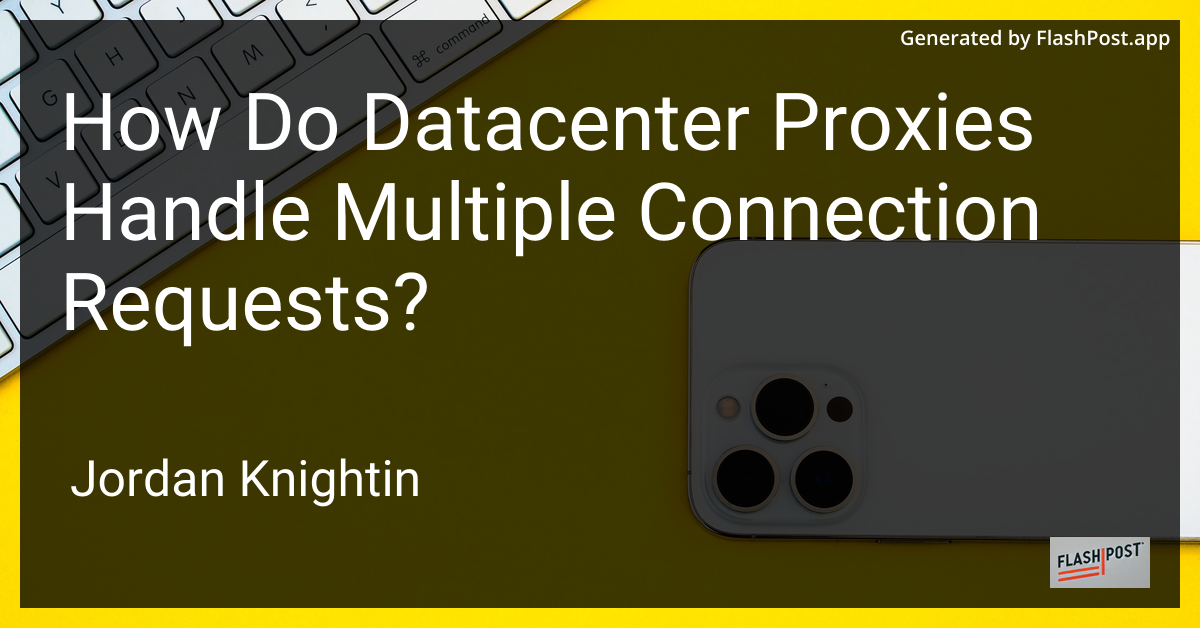

How Do Datacenter Proxies Handle Multiple Connection Requests?
In the world of digital networking, handling multiple connection requests efficiently is crucial. Datacenter proxies play a significant role in managing these requests, especially for businesses that require robust and scalable internet solutions. This article delves into how datacenter proxies work, their advantages, and how they manage multiple connections without compromising speed or security.
Understanding Datacenter Proxies
Datacenter proxies are IP addresses provided by a corporation to shield your original IP address. These proxies are not affiliated with Internet Service Providers (ISPs) and are typically housed within massive server facilities known as data centers. They offer high-speed connectivity due to their substantial infrastructural support and are ideal for activities that require intensive data processing and anonymity.
Handling Multiple Connection Requests
1. Load Balancing
One of the primary methods datacenter proxies use to handle multiple connection requests is through load balancing. Load balancers distribute incoming network traffic across multiple servers. By doing so, they ensure that no single server becomes a bottleneck, thereby enhancing performance and reliability.
2. Scalability
Datacenter proxies are designed to handle a large volume of requests, making them highly scalable. Whether you need to access multiple websites simultaneously or manage numerous automated tasks, datacenter proxies can efficiently distribute and manage these requests without lag.
3. Concurrency
Concurrency allows datacenter proxies to open multiple connections at once, which is vital for users who need to perform tasks simultaneously. This feature is particularly useful for web scraping, managing social media accounts, or conducting extensive research, as it significantly reduces the time required to process numerous requests.
4. IP Rotation
To manage multiple requests effectively, datacenter proxies often employ IP rotation. By rotating IP addresses, these proxies prevent individual IPs from being banned or flagged, thereby maintaining continuous access and anonymity. This technique ensures that even when handling numerous requests, the process remains undetectable and secure.
Benefits of Datacenter Proxies
-
High Speed: Due to their robust infrastructure, datacenter proxies offer exceptional speed, which is essential when managing multiple simultaneous connections.
-
Cost-Effective: Compared to residential proxies, datacenter proxies are generally more affordable, making them a cost-effective solution for businesses of all sizes.
-
Anonymity and Security: By masking your original IP address, datacenter proxies provide enhanced online privacy and protection against cyber threats.
Related Topics
-
How to Test if My Proxy is Working with TikTok in 2025: Testing your proxy to ensure it functions correctly with TikTok, especially in the evolving landscape of 2025.
-
Best Datacenter Proxies: A comprehensive guide on the best proxy services available today, helping you choose the right one for your needs.
-
Understanding TikTok Automation Proxy: Explore how proxies aid in TikTok automation and their role in enhancing performance.
In conclusion, datacenter proxies are indispensable tools for efficiently handling multiple connection requests. Their ability to provide load balancing, scalability, concurrency, and IP rotation makes them ideal for businesses that require robust, secure, and high-speed internet solutions. Whether you are conducting market research, web scraping, or managing social media, datacenter proxies can significantly enhance your operational capabilities.
